Election Day in coal country: A race to nowhere?
May 10, 2016 by Ken Ward Jr.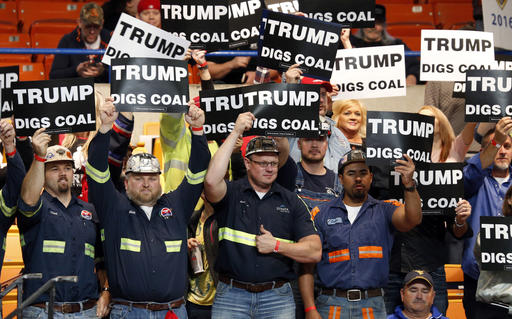
A group of coal miners waive signs for Republican presidential candidate Donald Trump as they wait for a rally in Charleston, W.Va., Thursday, May 5, 2016. (AP Photo/Steve Helber)
Across West Virginia, the polls have opened. Primary Election Day 2016 has begun. Now we vote.
Some things are likely decided already. It’s all but certain that Republican Donald Trump will face Democrat Hillary Clinton in the presidential race in November. The GOP candidate for governor in the fall will be Senate President Bill Cole. By the end of tonight, we’ll know who Cole will face from the three-candidate Democratic field.
It’s hard to imagine the primary election results providing much progress in addressing the serious problems communities face in the ongoing decline of the mining industry. In many ways, the discussion here is mired in the same place it was four years ago, when I wrote a post called “Before tomorrow: Election Day in coal country” on the day of the 2012 General Election.
Today’s primary doesn’t free us of campaign signs and pollster calls. It just sets us up for more of them between now and November.
Importantly, though, the candidates who will carry on to the General Election will in many ways set the tone for the political discourse and community discussion about what we collectively should be trying to do to make the coalfields a better place to live, work, and raise families.
It’s clear that the presidential race will feature Trump’s pandering efforts to convince West Virginia coal miners that they’ll all be back to work soon enough, after he eliminates the U.S. Environmental Protection Agency and all those nasty rules and regulations. Secretary Clinton offers at least some hope that she will try to focus coalfield voters on huge problems that loom, such as the financial crisis with the United Mine Workers of America’s health-care benefits and pension plan — and just as important a dose of realism about the need to ramp up efforts to diversify coalfield economies.
Unfortunately, the Clinton campaign has already given Trump and its friends in the coal industry the only soundbite they really need. We’ll be hearing it over and over and over and over. And one danger is that Secretary Clinton will buckle under on this, and start talking more and more about “clean coal” and carbon capture — catchphrases that only generate the same false hope that has the Trump campaign so popular with some of our state’s coal miners.
Whether Clinton has a chance in West Virginia — and whether West Virginia will turn out to be important at all in the national election for president — really is less important in the context I’m talking about than what the focus and tone of the campaign does to broader discussions about where the coalfields are headed.
Continue reading…
Bob Murray on Donald Trump
May 6, 2016 by Ken Ward Jr.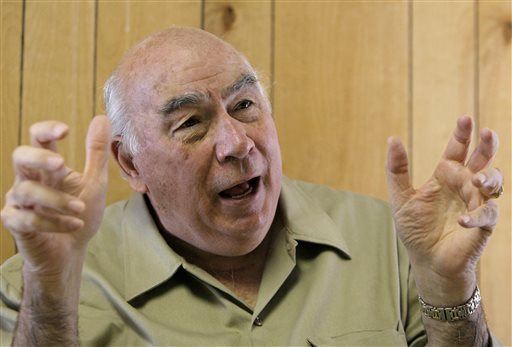
Last week’s very flattering New York Times profile of Murray Energy CEO Bob Murray had a little tidbit about Republican presidential candidate Donald Trump:
The day after his coal-mine visit, Mr. Murray delivered a lecture at West Liberty University, a small public college in nearby West Virginia. There, about 150 students packed a hall to earn extra credit for their business class.
Mr. Murray came with a five-page speech titled “The Ongoing Destruction of a Major American Industry,” which, among other things, described the “regal, outlaw Obama administration.” But once he reached the lectern, the speech was forgotten. Instead, Mr. Murray spoke extemporaneously.
He warned the students about government bureaucrats (“They are rejects compared with people in the private sector”); about Bernie Sanders (“The problem with socialists is that they eventually run out of other people’s money,” paraphrasing Margaret Thatcher); about the leading Republican presidential candidate (“I’m not sure about Donald Trump”); and about Ivy League schools (“These schools are lousy”).
He announced that he was organizing a fund-raiser for Ted Cruz, though he pointed out that he was not endorsing him.
That fundraiser occurred back in early April, and of course Sen. Cruz has since dropped out of the race. So I asked Murray spokesman Gary Broadbent for an update on Mr. Murray’s thinking on the election and here’s the statement he gave me:
Mr. Robert E. Murray has not, as yet, formally endorsed any Presidential candidate. It appears likely, however, that Mr. Donald J. Trump will become the Republican nominee for President. If nominated, we hope that Mr. Trump defeats Hillary Clinton, who has stated that, if elected President, she is “gonna put a lot of coal miners and coal companies outta business.” Mr. Murray is seeking for Mr. Trump to make the same very large and significant commitments to support the United States coal industry, which Senator Cruz has made.
What Trump didn’t tell the coal miners
by Ken Ward Jr.
Republican presidential candidate Donald Trump puts on a miners hard hat during a rally in Charleston, W.Va., Thursday, May 5, 2016. (AP Photo/Steve Helber)
Last evening at the Charleston Civic Center, Republican presidential candidate Donald Trump certainly had a lot to say about coal miners. As the Gazette-Mail’s David Gutman reported:
The backdrop behind Trump was filled with men in miner’s stripes and hard hats waving “Trump digs coal” signs, and Trump peppered his remarks with his admiration for coal miners.
“I’ll tell you what folks, you’re amazing people,” Trump said. “The courage of the miners and the way the miners love what they do, they love what they do.”
“If I win we’re going to bring those miners back,” he said.
Then there was this:
Trump said he has “always been fascinated” by mining, “the engineering that’s involved and the safety and all that’s taken place over the last number of years.”
“All of it’s getting safe and as it gets safe they’re taking it away from you in a different way,” Trump said. “These ridiculous rules and regulations that make it impossible for you to compete, so we’re going to take that all off the table folks.”
As Gutman also reported, Trump is offering no real plan for how he’s going to reverse the downward spiral of the Southern West Virginia coal industry, though he (like West Virginia Democratic front-runner Jim Justice) is making bold promises — promises — in the face of just about every credible projection or analysis of where coal is actually headed (see here, here and here).
Just as important, though, is another issue that Trump didn’t talk about at all: The growing crisis facing the pension and health-care funds that cover thousands upon thousands of United Mine Workers of America retirees and their families.
In the most recent UMWA Journal, union Secretary Treasurer Daniel Kane called this “the most important political issue facing the union right now. UMWA President Cecil Roberts told a U.S. Senate Committee in March:
… Today, there is a looming health care tragedy unfolding in the coalfields, with potentially devastating human effects. In many cases, the loss of health care benefits will be a matter of life or death. In all cases, it will be a financial disaster that the retired miners, who live on very meager pensions, will not be able to bear.
These are real people we are talking about. They live on small pensions, averaging $530 per month, plus Social Security. They rely very heavily on the health-care benefits they earned through decades of hard work in the nation’s coal mines … They spent decades putting their lives and health on the line every single day, going into coal mines across this nation to provide the energy and raw materials needed to make America the most powerful nation on earth. And they did that even though they knew they would pay a physical price for it.
Continue reading…
W.Va. Coal Association endorses Trump
May 5, 2016 by Ken Ward Jr.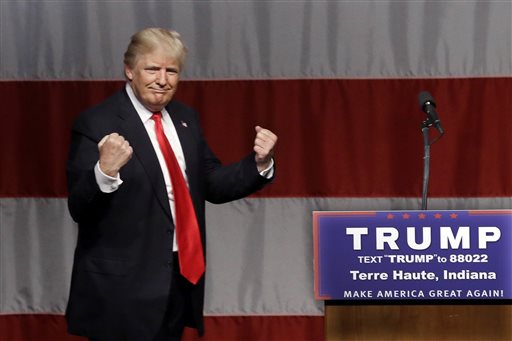
In this Sunday, May 1, 2016 file photo, Republican presidential candidate Donald Trump reacts to a song during a campaign rally at the Indiana Theater in Terre Haute, Ind. (AP Photo/Seth Perlman)
Here’s the latest from West Virginia Coal Association President Bill Raney:
The membership of the West Virginia Coal Association today announced it is endorsing Donald Trump, Republican of New York, for the office of president of the United States in this year’s election. The unanimous decision was made at a membership meeting in Charleston earlier today.
“Donald Trump has been firm and clear throughout his campaign in his commitment to rebuild America’s basic industries – the industries that made this country great – such as coal, steel and manufacturing” said Bill Raney, WVCA president, in announcing the endorsement. “Trump has said he will reverse the Democratic regulatory assault that has cost the coal industry more than 40 percent of our production and jobs since 2008.”
“In contrast, Hillary Clinton’s proposals essentially double-down on the job killing Obama policies,” Raney continued. “West Virginia can’t afford that and neither can the nation.”
“We believe that with the leadership team of Donald Trump in the White House and Bill Cole as Governor, West Virginia will begin to rebuild what we have lost to the Obama War on Coal and also look to the future once again with confidence.”
Donald Trump and the coal miners
by Ken Ward Jr.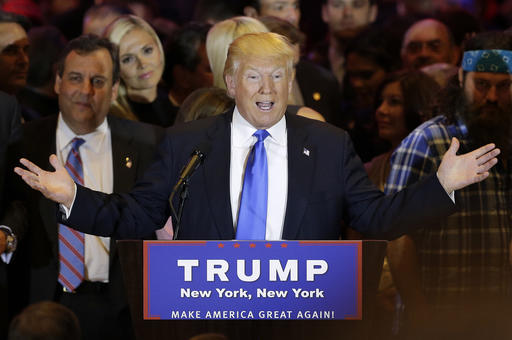
In this Tuesday, April 26, 2016 file photo, Republican presidential candidate Donald Trump speaks during a primary night news conference, in New York. (AP Photo/Julie Jacobson, File)
By sometime early this evening, West Virginians will get to see first-hand whether presumptive Republican presidential nominee Donald Trump can give Democratic gubernatorial front-runner Jim Justice a run for his money in the category of pandering to coal miners.
Justice, of course, is falsely telling our state’s hardworking miners and their families that if they will just elect him governor, West Virginia will end up “mining more coal … than has ever been mined before.” Justice told Hoppy Kercheval to “mark it down.” While Justice was blustering, two of his companies were on trial in Wyoming County, facing a suit from 15 families who say one of his mining operations contaminated their drinking water wells. (UPDATED: The jury in the Wyoming County case ruled in Justice’s favor.)
Trump, meanwhile, had this to say the other night after winning the GOP primary in Indiana:
… And West Virginia. And we’re going to get those miners back to work. I’ll tell you what. We’re going to get those miners back to work … we’re not going to be Hillary Clinton, and I watched her three or four weeks ago when she was talking about the miners as if they were just numbers and she was talking about she wants the mines closed and she will never let them work again.
Let me tell you, the miners in West Virginia and Pennsylvania which was so great to me last week and Ohio and all over, they’re going to start to work again. Believe me. You’re going to be proud again to be miners.
The Associated Press has a pretty decent “fact check” item out on the subject of Trump and Appalachian coal. The AP concludes:
Trump, however, has yet to explain exactly how he will revitalize Appalachia’s coal industry. To pull it off, he will have to overcome market forces and a push for cleaner fuels that have pummeled coal.
Coal’s slump is largely the result of cheap natural gas, which now rivals coal as a fuel for generating electricity. Older coal-fired plants are being idled to meet clean-air standards.
Another hurdle for reviving coal mining in Appalachia: less coal. Reserves of coal still in the ground are smaller than in western states like Wyoming, the leading coal producer.
The story goes on:
It is unclear what Trump would do to increase mining jobs. He has long criticized the Obama administration’s Environmental Protection Agency, saying that its proposals to tighten emission standards on coal-burning power plants are killing American jobs. A Trump adviser said that a Trump administration would review many EPA regulations including those affecting the coal industry.
While the requirements have raised the cost of operating coal-fired plants, experts say a bigger factor in coal’s decline has been cheaper natural gas. Drilling techniques such as fracking have sparked a boom in gas production, driving down prices and prompting utilities to switch from coal.
As recently as 2008, about half the electricity in the U.S. came from burning coal and one-fifth from burning natural gas. Today, each accounts for about one-third — nuclear, hydroelectric and renewables like solar and wind make up most of the rest. Weak economic growth has hurt demand for Appalachian coal used in making steel.
Continue reading…
Hillary Clinton on Blankenship
May 3, 2016 by Ken Ward Jr.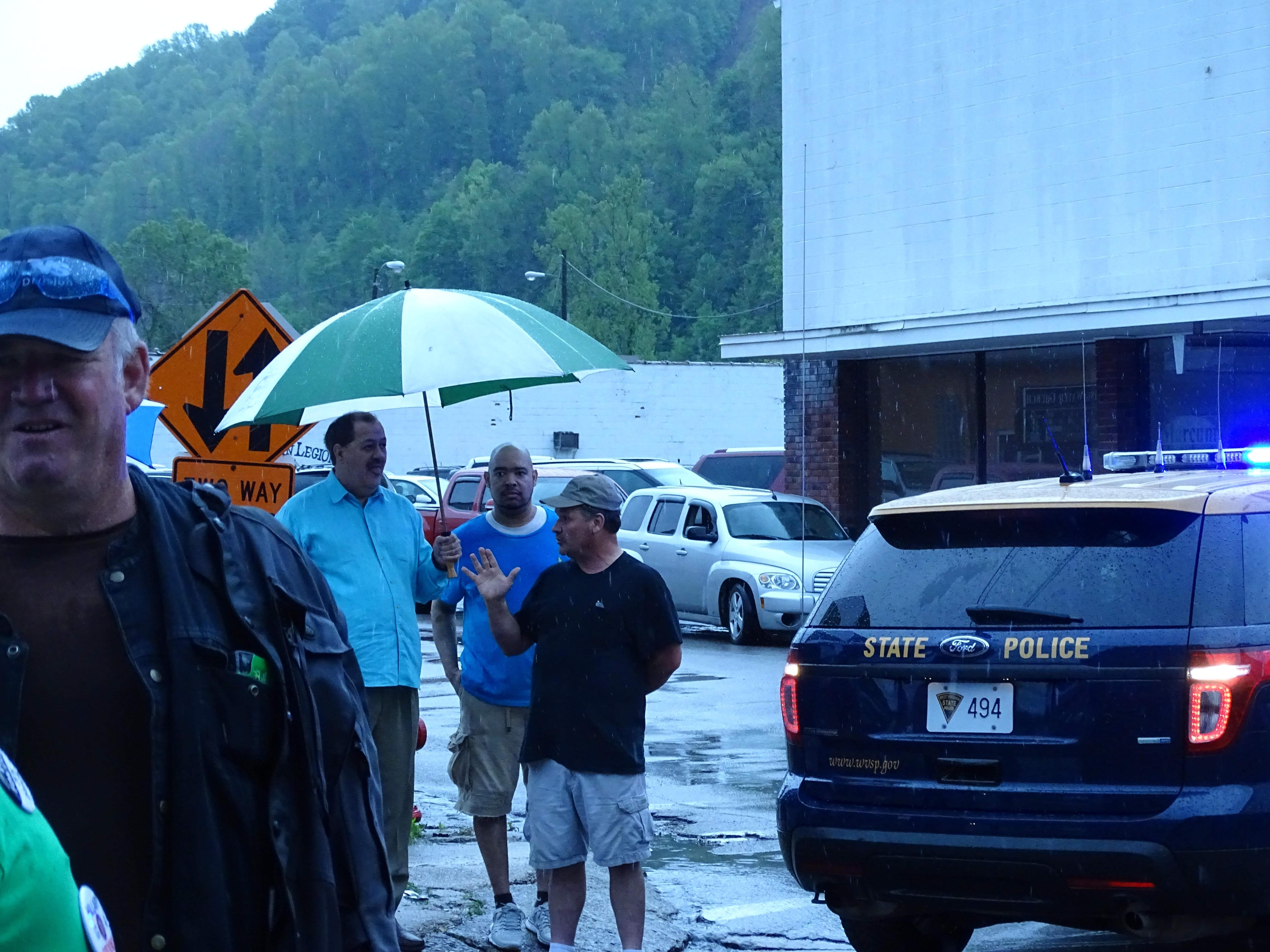
Photo by Daniel Desrochers – Former Massey Energy CEO Don Blankenship stands outside the Hillary Clinton event in Williamson on Monday.
Democratic presidential candidate Hillary Clinton’s campaign has issued a statement late this morning about the appearance of former Massey Energy CEO Don Blankenship among the protesters outside Clinton’s event yesterday in Williamson. Here’s the statement from Clinton West Virginia State Director and Huntington Native Talley Sergent:
It was a pretty outrageous sight to see Don Blankenship, of all people, apparently rallying against Hillary Clinton’s plans and commitment to help our coal communities. As President, Hillary Clinton will prioritize federal legislation to make sure the likes of Don Blankenship can never again get away with showing such blatant disregard for our miners and their safety.
Our campaign is proud not to have Don Blankenship’s endorsement. If Donald Trump wants to accept his support, then he owes a serious explanation to the families of our miners we lost at Upper Big Branch and the people of West Virginia.
Coalfield political theater masks path to progress
by Ken Ward Jr.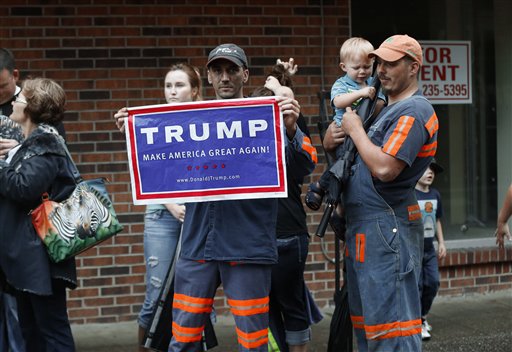
Coal miner Chris Steele holds a sign supporting Donald Trump outside a Democratic presidential candidate Hillary Clinton event in Williamson, W.Va., Monday, May 2, 2016. (AP Photo/Paul Sancya)
You’ve got to give Democratic presidential candidate Hillary Clinton some credit, I guess. It would have probably been easier — especially at this stage of the campaign — to ignore places like Mingo County, West Virginia.
There’s plenty of media coverage already about the Democratic Party’s problems in the coalfields. What’s the upside to basically giving your opposition — not only in the November presidential race, but in races for control of Congress, state legislatures and governor’s offices — a handy pep rally?
Maybe the Clinton people have some polling that suggests they have some kind of shot to win here in the general election, though most people who follow such things seem to think otherwise. Maybe, as Sen. Joe Manchin was pitching the last few days, the Clintons really just care about showing their face in places that might otherwise think they’re just being left behind.
And maybe the Democrats generally really want to put some force behind the various plans — President Obama has one, so does Secretary Clinton and so does Sen. Bernie Sanders (so do Republicans like Reps. David McKinley and Evan Jenkins, by the way) — to try to deal with some of the coal industry’s massive legacy liabilities as part of a broader effort to find some path forward for communities whose main industry is in a steep decline.
It’s good to keep plugging those proposals. The huge financial problems facing the health-care and pension plans of the United Mine Workers of America have to be dealt with for anything good to happen in the coalfields. Finding a way to pump more money from the federal Abandoned Mine Land program to coal-mine cleanups would help improve the environment and public health here, while spurring job creation.
But aren’t the Democrats missing something? Shouldn’t they even just once in a while make a larger point that life with coal as your only industry isn’t as rosy as some of the revisionist histories make it sound? Mines blow up. Slurry dams collapse. Workers die a slow, agonizing death from black lung. Pollution of the air, land and water makes people sick.
Continue reading…
Unwanted: The Clintons and the coalfields
May 2, 2016 by Ken Ward Jr.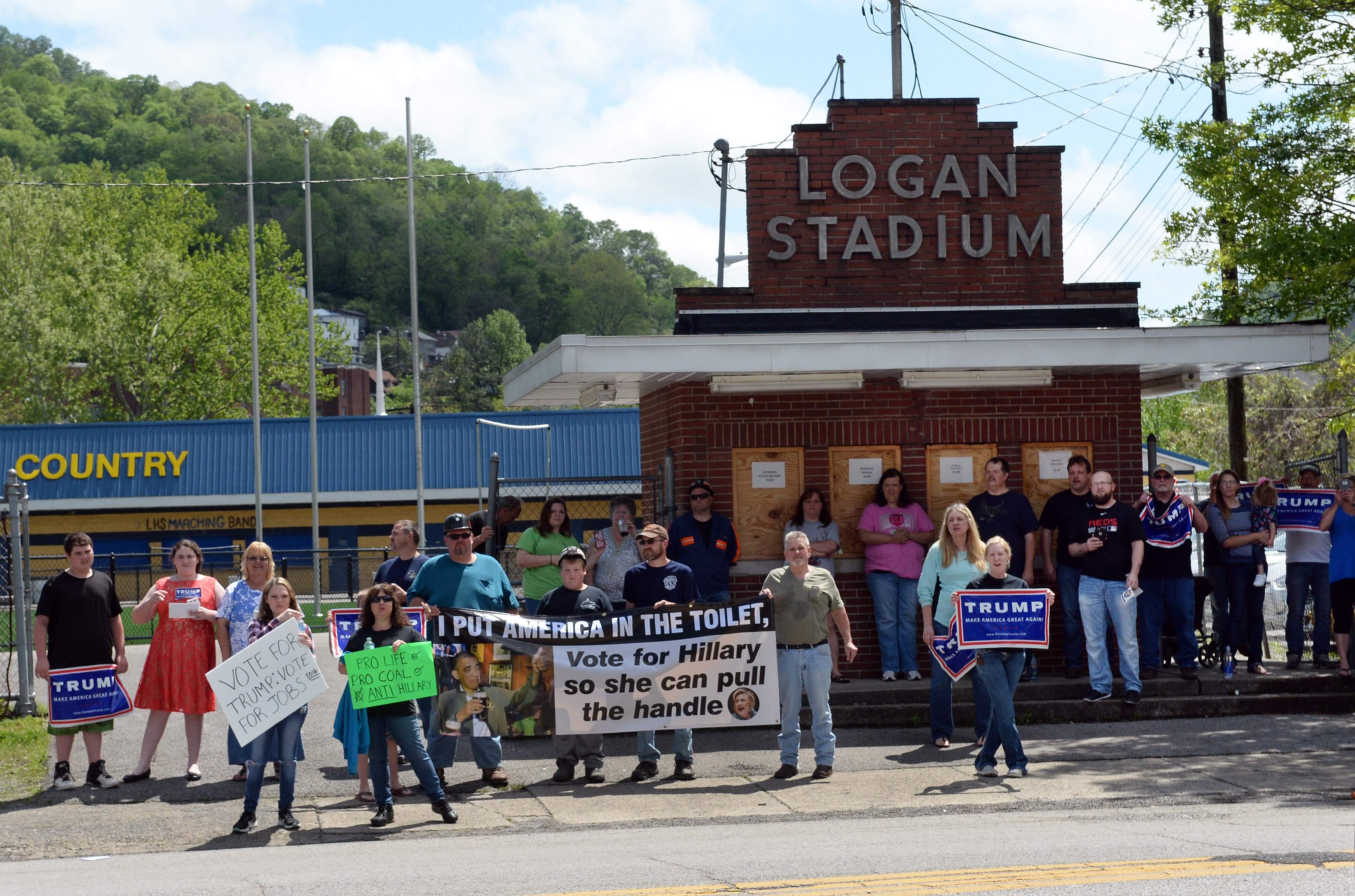
Photo by Chris Dorst – Trump supporters protest across from Logan Middle School, Sunday, before Bill Clinton’s arrival for a rally.
For the last four or five years, one of the rally cries among the “War on Coal” crowd has been that it was unfair for the Obama administration to be putting in place new environmental rules on coal-fired power plants without coming to the coalfields to hear from people whose “way of life” might be affected.
On this blog, I’ve actually made this point myself — and agreed that Sen. Shelley Moore Capito, R-W.Va., was right to push for a visit and a public hearing by U.S. Environmental Protection Agency Administrator Gina McCarthy.
So naturally, when the leading Democratic presidential candidate’s campaign plans a visit to Logan, the local establishment puts out the word that former President Bill Clinton isn’t welcome in their town. And local supporters of Republican front-runner Donald Trump show up to put their best foot forward in seeing that the region’s economic concerns get a fair hearing.
Of course, one of the major problems here is the flawed notion that if the EPA just dropped its efforts to do something about climate change, the coal industry would suddenly rebound.
Interestingly, reporting from yesterday’s events by the Gazette-Mail’s David Gutman showed that while some in Logan County cling to this hopeless idea, others are more thoughtful about the situation their community finds itself in:
Kevin Stone works for National Armature and Machine, a motor and water pump service business in Holden, Logan County.
“They think this is just hurting the coal jobs, but it’s killing everyone,” he said. “My family’s lived in West Virginia for generations, I’ve been a Democrat all my life and now I’m never voting for a Democrat.”
Arnold Killen, of Harts in Lincoln County, held a Trump sign outside the Logan rally. Did he think Trump would bring back the coal industry?
Killen shrugged, “Well, he didn’t say he was going to destroy it.”
Inside the cafeteria, where the crowd ultimately drowned out protests, there was far more Clinton support.
“I think she’s good for women and children,” Marsha Bryant, of Holden, said. “I happen to be a woman and I think it’s time.”
Anita Weyenberg, Bryant’s sister and another Clinton supporter, noted that they were both daughters of a coal miner.
“Daddy hated the fact that his kids wanted to go in the mines,” she said. “The mines are gone. They’re not coming back. I think it’s time to move on.”
Continue reading…
Study links mountaintop removal to lung cancer
by Ken Ward Jr.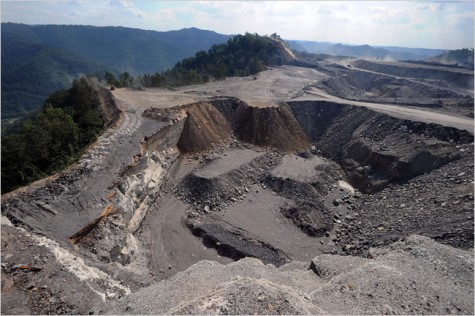
A recent study — another in a long line of them — about mountaintop removal’s public health impacts is making the rounds on social media.
My apologies for missing this when it was originally posted online (apparently in February), but here’s the link, and the study is called, “Lung and Bronchus Cancer Deaths in Boone County, WV, Before and After Mountaintop Removal Mining.”
Basically, the study found that:
Lung and bronchus cancer [LBC] death rates have increased significantly since the introduction of MTR in Boone County (all genders, ages, corrected for age). All site cancer death rates have likewise increased significantly over time. There were significantly more deaths from LBC in MTR counties than in non-MTR counties of WV. The Boone County deaths could not be completely accounted for by smoking cigarettes … Occupation had no effect on deaths from LBC for males, however, for females; homemakers had a significantly elevated risk of death than their working counterparts.
The study concludes:
The population in Boone County has decreased over time. Other sources of air pollution and routes of contaminant exposure may have contributed to these increases but if so their nature and source(s) are not known. In the absence of other sources of exposure, the data suggest that the introduction of mountaintop removal mining could have affected mortality in Boone Co., WV.
Blankenship: Waiting on the 4th Circuit
April 28, 2016 by Ken Ward Jr.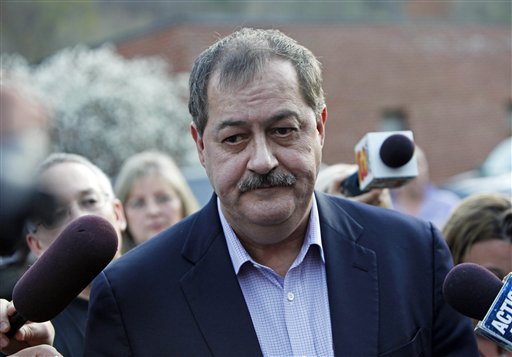
Last evening, the defense team for former Massey Energy CEO Don Blankenship filed the last of its arguments in its effort to keep Blankenship from having to begin serving his prison sentence while an appeal of his conviction is being considered.
I’ve posted a copy of the defense’s latest filing with the 4th U.S. Circuit Court of Appeals here. Blankenship’s original argument to the 4th Circuit that he be allowed to stay free on $1 million bond pending his appeal is here, and the government’s response is here.
The defense’s new filing from last night argues, as did their original brief, that Blankenship’s appeal of his conviction raises at least four significant issues:
— That U.S. District Judge Irene Berger gave the jury an incorrect definition of what constitutes a “willful violation” under federal mine safety laws.
— That the indictment against Blankenship was legally insufficient because it alleged safety violations without identifying the safety standards Blankenship conspired to violate.
— That Judge Berger refused to allow the defense a second shot at cross-examining former Massey official Chris Blanchard.
— That the judge wrongly gave the jurors a definition of “reasonable doubt.”
For the 4th Circuit to stay Blankenship’s sentence pending his full appeal, the court has to be convinced that at least one of these issues raises a substantial question that, if decided in Blankenship’s favor, would warrant his conviction or sentence being overturned. Without action by the 4th Circuit, Blankenship is scheduled to report to a so-far unidentified federal prison on May 12.
Prosecutors have made clear that bond release pending appeal is supposed to be the exception in the federal system, and they added this quote from an earlier case, which explains that just because some defendants can afford better lawyers to try to raise better questions on appeal doesn’t mean that bond release should be a given in those cases:
Federal district courts and judges in the courts of appeals know very well that the Congressional policy behind the Bail Reform Act and the subject of post-conviction and sentencing detention must be wisely administered, in order to protect the criminal justice system from the wrong perception that judges have two measuring sticks, one for regular criminals and a more lenient one for the white-collar defendant.
Jim Justice doubles down on climate change denial
April 27, 2016 by Ken Ward Jr.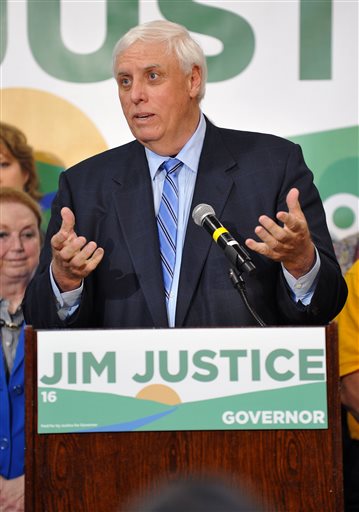
It’s not enough that Democratic gubernatorial candidate Jim Justice is tossing around nonsense about how electing him will assure that West Virginia “mines more coal … than has ever been mined before.” Now, Justice is just tossing science on climate change totally under the bus. Just look at what he told the Beckley paper:
Until we have really accurate data to prove (that humans contribute) I don’t think we need to blow our legs off on a concept. I welcome the scientific approach to it and the knowledge. I would not sit here and say, ‘absolutely now, there’s no such thing’ or I would no way on Earth say there is such a thing. I believe there’s an awful lot of scientist that say, ‘no, no, no, this is just smoke and mirrors.’ I welcome the discussion, but I don’t know, I just don’t know.
Until we have really accurate data? Smoke and mirrors? Despite what he says, it’s clear that Justice doesn’t welcome the scientific approach to this issue.
Prosecutors oppose Blankenship bail during appeal
April 26, 2016 by Ken Ward Jr.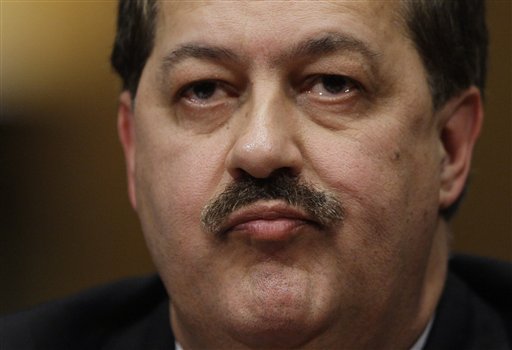
Last night, prosecutors filed their brief with the 4th U.S. Circuit Court of Appeals to oppose former Massey Energy CEO Don Blankenship’s request to remain free on bail while appealing his conviction for conspiring to violate federal mine safety and health standards.
Here’s their summary of their argument:
A criminal defendant’s conviction and sentencing bring with them a strong presumption that he will serve his sentence without delay. By his motion to stay his sentence pending appeal, Defendant-Appellant Blankenship (“Defendant”) seeks to evade that presumption. He cites four supposed reversible errors and says his sentence should be delayed because of them. The record reveals, however, that the district court was exceptionally careful and thorough in resolving Defendant’s legal contentions both before trial and during it. Defendant’s appellate claims simply are weak, and success for him on appeal is improbable.
I’ve posted a copy of their brief here.
Also, here’s a copy of a 4th Circuit order that set the schedule for legal briefs in the appeal of Blankenship’s conviction. Initial briefs are due May 31. Remember that, pending action by the 4th Circuit to stay his sentence, Blankenship is scheduled to report to prison on May 12.
New Goodwin Blankenship ad: ‘Take it back, Jim’
April 25, 2016 by Ken Ward Jr.Take it Back Jim from Goodwin for WV on Vimeo.
It looked like that maybe Democratic gubernatorial candidate Jim Justice was going to wisely steer clear of bringing the discussion in the campaign back around the the prosecution of Don Blankenship — or anything that would remind voters of Justice’s own mine safety problems, like his history of not paying his U.S. Mine Safety and Health Administration fines.
But rival candidate Booth Goodwin, who has U.S. Atttorney prosecuted Blankenship — isn’t going to let Justice just walk away from this one.
This morning, the Goodwin campaign unveiled a new ad (it’s being distributed on social media, at least) featuring Dr. Judy Jones Peterson, whose brother, Dean Jones, died at Blankenship’s Upper Big Branch Mine. Here’s what Dr. Peterson says:
I don’t really understand why Mr. Justice would step out against the integrity of this incredible prosecution team. He of all people as a coal mining operator should understand the plight of coal miners, but I think unfortunately that the plight he understands best is the plight of Don Blankenship.
As some readers may recall, Dr. Peterson had previously asked that Jim Justice issue a public apology after Justice questioned the Blankenship prosecution.
Aside from the gubernatorial campaign, one potential impact of this strategy by the Goodwin team is to give more ammunition to Blankenship’s defense lawyers, who certainly want to make an issue in their appeal of the politics they say drove the entire prosecution in the first place. So far, this argument from Blankenship’s lawyers didn’t get any traction with U.S. District Judge Irene Berger or much sympathy from the jury — but who knows what might happen going forward.
On the other hand, it’s certainly different to hear a candidate for governor in West Virginia campaign on the fact that he prosecuted a coal company CEO for putting miner safety and health at risk.
I’ve asked the Justice campaign and the Blankenship defense team if they’d care to comment on this new ad, and will update readers if I hear back from them.
Labor finalizes black lung benefit rule
by Ken Ward Jr.Here’s the announcement today from the U.S. Department of Labor:
The U.S. Department of Labor’s Office of Workers’ Compensation Programs today issued a final rule to strengthen safeguards for the health of coal workers. The rule makes significant revisions to the regulations implementing the Black Lung Benefits Act that will give miners greater access to their health information, bolster the accuracy of claims decisions, and require coal mine companies to pay all disability or survivor’s benefits due in a claim before modification can challenge the award.
As readers know, this rule comes after Chris Hamby’s Pulitzer Prize-winning expose about how doctors and lawyers worked to keep miners from getting their benefits.
You can read the final rule here.
Jim Justice dodges hard truth about coal’s decline
by Ken Ward Jr.
In an otherwise typical press release responding to the downgrading of West Virginia government’s bond rating, Gov. Earl Ray Tomblin had a pretty interesting line. It went like this:
During my State of the State address, I acknowledged the unprecedented shift that has taken place in our state and our nation and its impact on our state’s coal industry. Across the country and around the world, the coal industry – an economic driver that has supported West Virginia for generations – is facing serious challenges. This is not a typical downturn. This one is different, and even the most optimistic among us realize it is unlikely that coal will ever reach the production levels of the past.
Gov. Tomblin and his staff must have missed what one of their party’s candidates said the other day on Hoppy Kercheval’s “Talkline” radio show. Here’s the full quote from Democratic gubernatorial candidate (and coal operator and billionaire) Jim Justice:
I am telling you and you just mark it down. Jim Justice is telling you today two things. We are going to end up in West Virginia mining more coal in West Virginia than has ever been mined before. Mark it down. And the other thing is we’ve got to be diversified off the chart, because even when we were mining coal at our highest levels we were still 50th at everything coming or going. What does that tell us? It tells us we’ve got to have everything else. We’ve got to have tourism and agriculture and education and on and on and on.
Justice has a good point there in that last part — West Virginia’s economy has always been challenging, even when the coal industry was going great guns. But let’s just look at that first part again:
We are going to end up in West Virginia mining more coal in West Virginia than has ever been mined before.
Really?
Maybe there’s some analysis I haven’t seen, or some report that’s not yet been widely circulated. Maybe Jim Justice knows something the rest of us don’t. He is a billionaire after all. And he loves West Virginia.
So I asked Justice campaign spokesman Grant Herring for more information. Starting last Wednesday, I wrote to Grant about Justice’s statements:
I’m hoping that you could point me to 3 examples of independent experts or published reports that support this statement as being factual.
If you don’t have three independent experts or published reports, I’d be interested in whatever data or evidence Mr. Justice and/or his campaign have that would tend in any way to support this statement? What exactly is the basis for such a statement?
Didn’t hear a word back. Wrote him twice more. Crickets.
Continue reading…
WVDEP sued over reclamation site pollution
April 20, 2016 by Ken Ward Jr.As so much attention swirls around the potential environmental consequences of the rash of coal industry bankruptcies, two new lawsuits filed today by the West Virginia Highlands Conservancy and other groups provide some much needed context to that issue.
Here’s the press release, issued by the Sierra Club:
Today, a coalition of environmental and community groups filed two lawsuits in federal district courts in West Virginia to hold the state accountable for mining pollution generated from seven former mine sites now owned and managed by the WV Department of Environmental Protection (WVDEP).
When mine operators in West Virginia go out of business before they complete all of the reclamation required by law, the state becomes responsible for finishing the clean-up, including managing any water pollution coming from the site. However, coal mines continue to generate harmful water pollution long after the mines are shut down. Today’s lawsuits allege that West Virginia is violating the Clean Water Act by discharging a variety of mining pollutants at levels that exceed water quality standards and permit limits from sites in Barbour, Nicholas, and Preston counties.
The lawsuits — I’ve posted them here and here — target alleged violations at sites where the DEP holds water pollution permits as part of its troubled Special Reclamation program, where the agency treats pollution left by bankrupt mining operations, but the sites still involve some regulated discharge. In the end, what environmental groups really want is to force the state to provide more funding — hopefully from the coal industry — to ensure that discharges from these and other sites don’t violate permit limits.
Cindy Rank, mining chairwoman for the Highlands Conservancy, said:
By burying their heads in the sand these past two decades and ignoring how the looming crisis of bankrupt coal companies would further deplete the state’s inadequate Special Reclamation Fund, West Virginia lawmakers have virtually guaranteed that citizens and taxpayers will be the ones responsible for cleaning up these coal company messes.
Kelley Gillenwater, spokeswoman for the WVDEP, declined to comment on the lawsuits.
Report supports need for ‘Future Fund’
April 19, 2016 by Ken Ward Jr.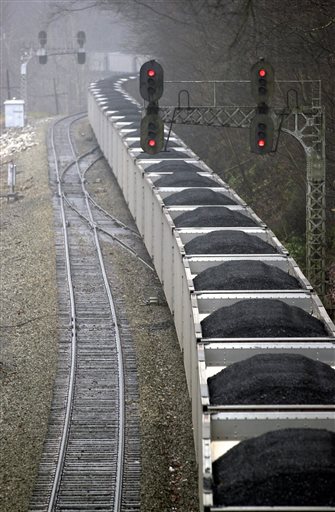
A C.S.X. train loaded with coal winds its way into the mountains in this Nov. 21, 2004 file photo taken near the New River at Cotton Hill in Fayette County, W.Va. (AP Photo/Jeff Gentner)
There’s a new report out from the Bookings Institute that’s worth taking a look at. Here’s what the press release says:
The recent boom and bust of unconventional oil and gas development, or “fracking,” has reopened serious questions about resource management in many U.S. states. While the oil and gas boom generated revenue, jobs, and economic development, the recent bust has adversely impacted state budgets due to declining industry investments in exploration and production and job cuts.
The boom-bust cycle of unconventional oil and gas development highlights the need for strategic management by state governments of fracking-related revenues, not only to minimize the less desirable aspects of the boom-bust cycle but also to enhance long-term prosperity. States can address these challenges by imposing a reasonable severance (extraction) tax on their oil and gas industry and channeling a portion of the revenue into permanent trust funds. In doing so, states can convert volatile near-term revenues from unconventional oil and gas development into a longer-term and continuous source of investment funds for building sustainable and dynamic economies.
Locally, the West Virginia Center for Budget and Policy is noting the significance of this issue to our state:
Peabody files for Chapter 11
April 13, 2016 by Ken Ward Jr.
Here’s the big news this morning from Peabody Energy:
Taking a major step to strengthen liquidity and reduce debt amid an unprecedented industry downturn, Peabody Energy Corporation (NYSE: BTU) today voluntarily filed petitions under Chapter 11 for the majority of its U.S. entities in the United States Bankruptcy Court for the Eastern District of Missouri. Through this process, the company intends to reduce its overall debt level, lower fixed charges, improve operating cash flow and position the company for long-term success, while continuing to operate under the protection of the court process.
All of the company’s mines and offices are continuing to operate in the ordinary course of business and are expected to continue doing so for the duration of the process. No Australian entities are included in the filings, and Australian operations are continuing as usual.
I’ve posted a copy of their Chapter 11 Petition here.
As has been widely reported, this isn’t really any surprise. Readers in West Virginia might want to recall this, which we reported last month:
More than three-quarters of Peabody’s production comes from the Powder River Basin, in Wyoming, where the company’s North Antelope Rochelle Mine last year generated 109 million tons of coal, more than all of the mines in West Virginia combined.
Twenty years ago, Peabody, through its Eastern Associated Coal Corp. subsidiary, was among West Virginia’s largest coal producers. Today, the company lists no producing mines in West Virginia in its filings with MSHA. Peabody has no active mining permits on file with the West Virginia Department of Environmental Protection, with all the permits in its name having been reclaimed, said DEP spokeswoman Kelley Gillenwater.
In explaining its move to seek bankruptcy protection while reorganizing, Peabody said this:
‘One of the good coal operators’
April 12, 2016 by Ken Ward Jr.
Last week, after U.S. District Judge Irene Berger sentenced Don Blankenship to the maximum penalty allowed by law — one year in jail and a $250,000 fine — Democratic gubernatorial candidate Jim Justice had little to say about the historic events of the day. His campaign spokesman issued this statement:
What’s important today are the feelings of the families who lost loved ones. I hope all of the families have the opportunity to be heard on whether or not they feel justice was served.
But it sounds like Justice has decided to add to those comments, at least according to this story from WOAY:
I think we spent an ungodly amount of money within our state to probably keep Booth Goodwin in the limelight and end up with a misdemeanor charge. If that’s all we are going to end up with, why did we spend that much money to do that?
This comes a day after Justice’s gubernatorial campaign was touting a new campaign ad in which United Mine Workers of America President Cecil Roberts — in what seemed like quite an awkward phrase — called Justice “one of the good coal operators.”
Continue reading…
Pages
Search this blog
Recent Posts
- The politics of why Don Blankenship isn’t a felon
- What politicians could say when coal miners die
- Merry Christmas from Coal Tattoo
- The real story of the Hobet project and how lax mountaintop removal regulation has held back coalfield development
- The Don Blankenship Senate campaign: Asking the wrong question about the Upper Big Branch Mine Disaster
Archives
Categories
- Abandoned mines
- Air pollution
- Alternative energy
- Black lung
- Blankenship Trial
- Blog business
- Books
- Business
- CCS
- Climate policy
- Climate science
- Coal ash
- Coal business
- Coal pollution
- Congress
- Corporate welfare
- Green jobs
- Health
- History
- International news
- Labor
- Legal actions
- Legislature
- Media coverage
- Mine Safety
- Mountaintop Removal
- OSMRE
- Peak coal
- Politics
- Power lines
- Protest actions
- Selenium
- Slurry impoundments
- Strip mine science
- Uncategorized
- Upcoming events
- Upper Big Branch Disaster
- Water pollution
- Workplace safety


 Subscribe to the Coal Tattoo
Subscribe to the Coal Tattoo